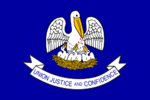Gubernatorial elections, 2011
This Ballotpedia article needs to be updated.
This Ballotpedia article is currently under review by Ballotpedia staff as it may contain out-of-date information. Please email us if you would like to suggest an update.
| State Executives |
|---|
| Current Governors |
| Gubernatorial Elections |
| 2024 • 2023 • 2022 • 2021 • 2020 • 2019 • 2018 • 2017 • 2016 • 2015 • 2014 |
| Current Lt. Governors |
| Lt. Governor Elections |
| 2024 • 2023 • 2022 • 2021 • 2020 • 2019 • 2018 • 2017 • 2016 • 2015 • 2014 |
Three states, Kentucky, Louisiana, and Mississippi, had scheduled gubernatorial elections in the 2011 electoral cycle. A fourth state, West Virginia, held a special election following a court order.
In Kentucky and Louisiana, incumbents Steve Beshear (D - Kentucky) and Bobby Jindal (R - Louisiana) won re-election. Mississippi's Haley Barbour was prevented by term limits from running for re-election and his lieutenant governor, Republican Phil Bryant, won election as his successor. In West Virginia, acting Governor pro tem Earl Ray Tomblin won a special election to a 14-month term.
- See also: Lieutenant Governor elections, 2011
 Kentucky
Kentucky
Kentucky elects the governor and the lieutenant governor on a shared ticket; the two offices have a single primary race.
The state's current Governor, Steve L. Beshear (D), first elected in 2007, easily won re-election in 2011. His former lieutenant governor, Daniel Mongiardo, ran for and lost the Democratic primary for the Class III U.S. Senate seat currently held by Republican Rand Paul. Beshear's running mate for 2011 is Jerry Abramson, a former Louisville mayor.
Beshear and Abramson defeated both the Republican team of state Senate President David Williams and outgoing Agriculture Commissioner Richie Farmer and an independent candidate, trial attorney Gatewood Galbraith, and his running mate, Dea Riley.
 Louisiana
Louisiana
The Louisiana gubernatorial election of 2011 was decided on October 22, 2011 in the primary election. Incumbent Republican Bobby Jindal captured more than 50% of the vote in the blanket primary, winning re-election outright.
 Mississippi
Mississippi
Republican Phil Bryant, the state's current lieutenant governor, defeated Democrat Hattiesburg mayor Johnny DuPree.
Term limits prevented the state's current Governor, Haley Barbour, from running for a third term, and there was a large field of candidates jockeying for his seat. Both Republicans and Democrats had multiple candidates enter the primary elections, two candidates claiming to represent the Reform Party sought a spot on the ballot, and one independent candidate qualified for the general election.
In early September 2011, though, all three third-party candidates were removed from the ballot. Independent candidate William D. Oatis withdrew from the race citing a lack of money to support his campaign, and the Mississippi State Board of Election Commissioners removed both Reform Party hopefuls, Bobby Kearan and Shawn O'Hara, from the ballot. Despite an announcement on the Reform Party National Committee's website that Kearan was their official candidate[1], the Mississippi State Board of Elections granted formal recognition to the O'Hara campaign. But O'Hara was also running for Mississippi Treasurer, and Mississippi Secretary of State Delbert Hosemann removed him from the gubernatorial race, citing a Mississippi law that stipulates candidates who file for multiple offices can only run in the race for which they filed most recently.[2]
 West Virginia
West Virginia
West Virginia was not scheduled to hold a gubernatorial election until 2012. However, elected Democrat Joe Manchin gave up the seat to join the U.S. Senate in the 2010 midterms. Senate President Earl Ray Tomblin, also a Democrat, took over the office as West Virginia does not have a lieutenant governor.
Multiple lawsuits sought to force a special election in 2011 for the remainder of Manchin's term rather than allow Tomblin to remain in office as an appointee until 2012, and on January 18, 2011, the West Virginia Supreme Court ordered a 2011 election in Citizen Action v. Tomblin - No. 101494.[3]
In the May primary, Earl Ray Tomblin and Bill Maloney easily won the respective Democratic and Republican nominations. The Mountain Party nominated Bob Henry Baber at the convention on the May 1st. Harry Bertram ran as an independent candidate.
Democratic incumbent Earl Ray Tomblin defeated Republican Bill Maloney, Mountain Party candidate Bob Henry Baber, Independent candidate Marla Ingels, and American Third Position candidate Harry Bertram.
Footnotes
- ↑ '"ReformParty.org, "Candidates: Mississippi," accessed September 20, 2011
- ↑ Chron.com, "2 candidates out of Miss. gov race, and 2 remain," September 9, 2011
- ↑ Supreme Court of Appeals of West Virginia, "STATE OF WEST VIRGINIA EX REL. WEST VIRGINIA CITIZEN ACTION GROUP, Petitioner v. EARL RAY TOMBLIN," filed January 18, 2011




